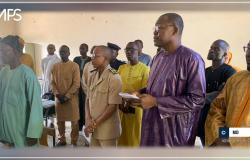
According to the expert in water management and hydro-politics, Mouhamadou Moustapha Ndiaye, also a doctor in political science at Gaston Berger University in Saint-Louis, Senegal must adopt new reforms in the water sector in Senegal focused on a sovereign governance strategy. Guest of the show Objection on Sudfm radio yesterday, Sunday May 26, Dr Mouhamadou Moustapha Ndiaye notably invited the new authorities to proceed with a resizing of the legal framework of the structures in charge of the management and regulation of the water sector in Senegal.
The expert in water management and hydro-politics, Mouhamadou Moustapha Ndiaye, also a doctor in political science at Gaston Berger University in Saint-Louis, provides some possible solutions to the problem of water shortage which affects several localities in the Senegal. Guest of the show Objection on Sudfm radio yesterday, Sunday May 26, Dr Mouhamadou Moustapha Ndiaye recommended new reforms of the water sector in Senegal by resizing the legal framework of the structures in charge of the management and regulation of water sector in Senegal. Facing our colleague Baye Oumar Guèye, Dr Mouhamadou Moustapha Ndiaye giving more details on these reforms which he recommended to the new authorities indicated that they will go through a resizing of the legal framework of the structures in charge of the management of water, review of the appropriate investment method and that of regulation.
“There are three things we need to do, firstly a reform and resizing of our institutions which need to be strengthened. Then, we should also work on the method of investment in the water sector. Are we going to continue to go into debt to work on hydraulic investments as has been done for almost several years? And finally, we must reinvent a new mode of regulation which allows us to dare to face the history of water with complete serenity by ourselves and for ourselves,” he assured. Continuing his remarks, the expert in water management and hydro-politics, Mouhamadou Moustapha Ndiaye, also recommended a global change of strategy on the issue of tax exemption for foreign companies in Senegal. Indeed, affirming that there are companies that do not pay taxes, the Doctor of Political Science at Gaston Berger University in Saint-Louis invited the new authorities to tackle this issue head on.
“We should certainly take it slowly but it is true that we should still, on the question of tax exemption for foreign companies which are currently in Senegal, be able to renegotiate to recover from the hatch . Also at the level of the local private sector, also ask them to involve citizens,” he suggested before insisting. “We are obliged to be one with this new wave of President Diomaye’s regime to be able to explain to the population that we have a collective destiny. We must implement the reforms that we have made so far. The rural drilling office (Ofor) responsible for working specifically in the rural world has made a lot of efforts but we realize that it is undersized. We should therefore review this by legally resizing its structure to allow the strategy and planning level to be able to seek funds.”
NANDO CABRAL GOMIS





